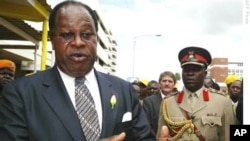Malawi’s Economic Planning and Development minister has resigned citing verbal attacks on him and his father, former President Bakili Muluzi, by senior officials of the government.
Atupele Muluzi, who is also presidential candidate for the opposition United Democratic Front (UDF) party said he was “appalled and mortified” by the attacks.
He said they “lacked the courtesy, mutual respect and dignity that is expected between colleagues who strive together in pursuit of a common cause to serve the people of Malawi selflessly and to the best of one’s abilities.”
“As a nation,” he continued, “this is the time when we need to put our economy back on track and try to address the serious and critical problems that our country is faced with.”
Malawi media reported that Vice President Khumbo Kachali and internal affairs minister Uladi Mussa, who are members of the ruling People's Party led the verbal attacks on the Muluzis.
Before his resignation, the younger Muluzi was urged by members of his party to quit the government and focus on unifying the group ahead of the next general election. The party has welcomed his resignation.
Muluzi said he joined the government due to his commitment towards alleviating the economic hardship many Malawians face due to what he said was mismanagement by the previous administration.
“I felt a moral responsibility to assist the government in paving an optimal path towards rectifying the political and economic decline largely attributable to mismanagement by previous dispensations and restoring, in some measure, the credibility and confidence that was subsequently lost. Neglect of these issues could have jeopardized the evolution of our fragile multiparty democracy and condemned Malawians to continued misery emanating from the throes of abject poverty,” Muluzi said.
In an interview with VOA Muluzi denied that his decision to join President Banda’s government will undermine the prospects of the UDF in the next general election.
He rejected criticisms that his lack of experience could lead to his party’s defeat in the general election.
“A majority of the population is just looking for a change in politics a change in the manner in which we have dealt with issues around the economy, around creating jobs and around policies,” Muluzi said.
Atupele Muluzi, who is also presidential candidate for the opposition United Democratic Front (UDF) party said he was “appalled and mortified” by the attacks.
He said they “lacked the courtesy, mutual respect and dignity that is expected between colleagues who strive together in pursuit of a common cause to serve the people of Malawi selflessly and to the best of one’s abilities.”
“As a nation,” he continued, “this is the time when we need to put our economy back on track and try to address the serious and critical problems that our country is faced with.”
Malawi media reported that Vice President Khumbo Kachali and internal affairs minister Uladi Mussa, who are members of the ruling People's Party led the verbal attacks on the Muluzis.
Before his resignation, the younger Muluzi was urged by members of his party to quit the government and focus on unifying the group ahead of the next general election. The party has welcomed his resignation.
Muluzi said he joined the government due to his commitment towards alleviating the economic hardship many Malawians face due to what he said was mismanagement by the previous administration.
“I felt a moral responsibility to assist the government in paving an optimal path towards rectifying the political and economic decline largely attributable to mismanagement by previous dispensations and restoring, in some measure, the credibility and confidence that was subsequently lost. Neglect of these issues could have jeopardized the evolution of our fragile multiparty democracy and condemned Malawians to continued misery emanating from the throes of abject poverty,” Muluzi said.
In an interview with VOA Muluzi denied that his decision to join President Banda’s government will undermine the prospects of the UDF in the next general election.
He rejected criticisms that his lack of experience could lead to his party’s defeat in the general election.
“A majority of the population is just looking for a change in politics a change in the manner in which we have dealt with issues around the economy, around creating jobs and around policies,” Muluzi said.









